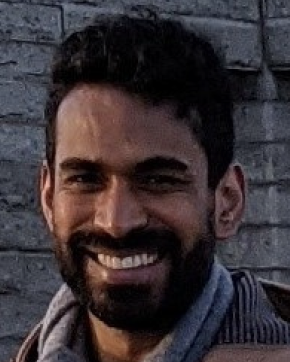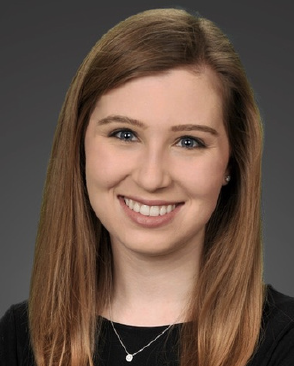Research Cafe: Parameshwaran Pasupathy & Mary Lally
Event Description
Research Cafe: May 10, 2023
3:00 - 4:00pm
679 Hoes Lane, Piscataway, NJ 08854 (Room #10)
Center for Advanced Biotech and Medicine, Busch Campus
Zoom option available.
~Snacks & coffee provided!~
Register to attend in person or on Zoom.
Students, faculty, and staff are invited to join the School of Graduate Studies as we enjoy, dialogue about, and learn from two fantastic graduate students -- Parameshwaran Pasupathy (Ph.D. student, Mechanical & Aerospace Engineering) and Mary Lally (Ph.D. student, Microbiology and Molecular Genetics) -- who will share their research in a friendly and low-stakes setting. Learn more about the presenters and their presentations below!
---
1.) "A Fractional Viscoelastic Model of the Axon in Brain White Matter" by Parameshwaran Pasupathy

Abstract: Traumatic axonal injury occurs when loads experienced on the tissue-scale are transferred to the individual axons. Mechanical characterization of axon deformation especially under dynamic loads however is extremely difficult owing to their viscoelastic properties. The viscoelastic characterization of axon properties that are based on interpretation of results from in vivo brain Magnetic Resonance Elastography (MRE) are dependent on the specific frequencies used to generate shear waves with which measurements are made. In this study, we aim to develop a fractional viscoelastic model to characterize the time dependent behavior of the properties of the axons in a composite white matter (WM) model. The viscoelastic powerlaw behavior observed at the tissue level is assumed to exist across scales, from the continuum macroscopic level to that of the microstructural realm of the axons. The material parameters of the axons and glia are fitted to a springpot model. The 3D fractional viscoelastic springpot model is implemented within a finite element framework using a vectorized user defined material (VUMAT) subroutine in ABAQUS finite element software. Representative Volume Elements (RVE) of axons embedded in glia are developed and subjected to a relaxation displacement boundary condition. The homogenized orthotropic fractional material properties of the axon-matrix system as a function of the volume fraction of axons in the ECM are extracted by solving the inverse problem.
Presenter Bio: Parameshwaran Pasupathy is a 4th year PhD student at the Department of Mechanical and Aerospace Engineering. His dissertation is on the multi-scale modeling of brain tissue, which is at the intersection of mechanobiology, computational solid mechanics, and interfacial mechanics. His interdisciplinary research on micro-scale modeling of white matter seeks to develop a fundamental understanding of brain injury and its relevance in detecting mTBI (mild-Traumatic Brain Injury), which is currently undetectable by standard diagnostic tools (such as MRI and DTI.). Paramesh has a Masters degree in Aerospace Engineering from the University of Michigan. Prior to beginning his PhD at Rutgers, Paramesh worked as an Senior Technical Engineer for Siemens PLM as a part of their HEEDS multi-disciplinary design optimization team.
2.) "Dissociating the local and systemic effects of the non-absorbable antibiotic vancomycin" by Mary Lally

Abstract: Vancomycin is commonly prescribed to treat Clostridioides difficile infections (CDIs), yet even with antibiotic treatment, CDIs cause 15,000 deaths per year. Previous studies have investigated vancomycin's impact on the microbiome and antibiotic resistance; however, none have differentiated between the antibiotic’s effects on the microbiome and on the host. When administered orally, vancomycin remains in the gut; it is neither absorbed nor metabolized. Since the microbiome has an important role in processing dietary fiber and training the immune system, vancomycin-induced changes likely affect the host’s ability to respond to infections and treatment. The long-term goal of this project is to elucidate the differences between local changes to the microbiome and systemic changes to the host induced by the non-absorbable antibiotic vancomycin. My hypothesis is that changes in the gut microbiota alter circulating factors like immune cells, lipids, and microbial metabolites to induce changes in host health. Understanding what alterations occur can eventually help counteract them to provide the best care for individuals with CDIs.
Presenter Bio: Mary Lally is a second year graduate student in the Microbiology and Molecular Genetics Program and works in Dr. Martin Blaser’s laboratory. She earned a B.S. in Biological Sciences in 2020 and M.S. in Cell and Molecular Biology in 2021 from Fordham University. Mary first became interested in the microbiome when she was an undergraduate student and studied the salamander skin microbiome. She researched how bacteria living on a salamander’s skin protect the amphibians from the deadly chytrid fungus. Now, Mary researches the impact of antibiotics on the mammalian microbiome and its host and hopes that her work will improve outcomes and care for patients that receive antibiotic treatment.
About Research Cafe
Research Café brings together the entire graduate student community of Rutgers University-New Brunswick/Piscataway campus to strengthen scholarly literacy and interdisciplinary research communication by providing a platform for budding researchers to connect, share their in-progress research or scholarship, and benefit from peer feedback in a friendly and low-stakes setting.
Research Café is a monthly, one-hour event to occur at rotating locations across the Rutgers New Brunswick/Piscataway campus (a Zoom option will be available, too). Each event will feature:
- Presentations (10-12 min. each) from two graduate students from across disciplinary areas ranging from engineering and biology to history and anthropology.
- A Q&A dialogue with peers and attendees.
- Conversational time over refreshments and snacks.
Sign up to attend in person or on Zoom at https://grad.rutgers.edu/research-cafe.
---
Questions? Contact the program coordinators:
Sonal Gahlawat at sg1389@scarletmail.rutgers.edu, Briana Bivens at bb770@grad.rutgers.edu, and Ramazan Güngör at rg835@grad.rutgers.edu.